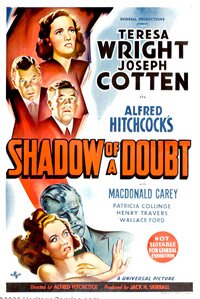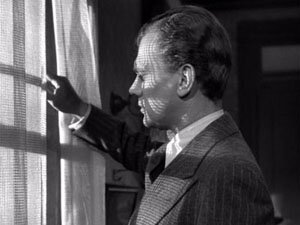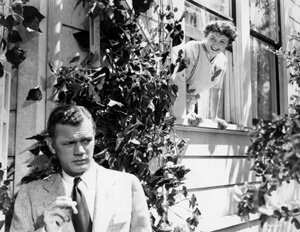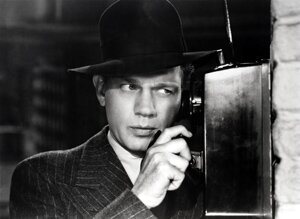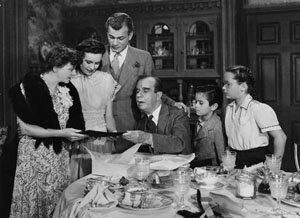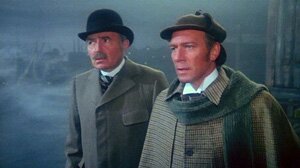 I was traumatized when I went to IMDb and saw Murder by Decree retitled as Sherlock Holmes and Saucy Jack. I have no idea why this occurred other than to guess this reflects some U.S. release, probably one that hoped to capitalize on the recent Sherlock Homes movie.
I was traumatized when I went to IMDb and saw Murder by Decree retitled as Sherlock Holmes and Saucy Jack. I have no idea why this occurred other than to guess this reflects some U.S. release, probably one that hoped to capitalize on the recent Sherlock Homes movie.
Apart from being an idiotic title (most people have heard the name Jack the Ripper; fewer are aware Saucy Jack was one of his nicknames), it is a misleading title. You can tell by looking at some of the comments on the IMDb message boards. A number are disappointed that the movie isn’t Jack the Ripper enough. But to use Alfred Hitchcock’s term, Jack is the McGuffin. The movie isn’t really about the Jack the Ripper.
It’s also not a movie with the Sherlock Holmes some people want. It’s an interpretation, an intriguing one I think. But if you want the Sherlock Holmes of the books, you really should read the books. That’s where he is.
What is the movie really about? Pay attention to the final scenes, particularly the one with Holmes and Lord Salisbury, the British Prime Minister played by John Gielgud. Listen to the argument Gielgud’s Lord Salisbury makes. You may find this movie an unusually apt one for our current era of security and threats and terror. If you do see it, watch for Christopher Plummer’s beautifully delivered response to the argument, “You’re all the same to me.”
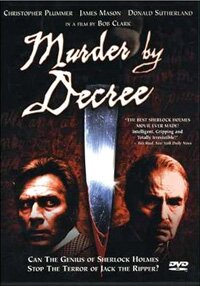 Murder by Decree (1979)
Murder by Decree (1979)
directed by Bob Clark
For me, the best movie Sherlock Holmes has always been Christopher Plummer in 1979’s Murder By Decree.
He’s definitely not the most Holmes Holmes. He plays him in far too humanized a way. So in terms of the Sir Arthur Conan Doyle stories, he’s not the most accurate.
But in terms of the story that is being told, and the way it is being told, he is thoroughly engaging and wonderful. Murder By Decree has always been one of my favourite movies.
It’s a very dark film both visually and in story terms. The film’s idea is simple: the world’s greatest consulting detective, Sherlock Holmes, takes on the case of the world’s most famous serial killer, Jack the Ripper.
But there is more: along the way Holmes uncovers secret societies and a despicable conspiracy that goes right up through the upper reaches of government to the throne of England itself. It is quite a task Sherlock Holmes has before him. (The script is based, in part, on Jack the Ripper theories that were current around the time the movie was made.)
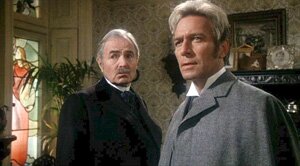 Along the way, Holmes is aided (as always) by his faithful Dr. Watson, played perfectly by James Mason. “Played perfectly” is a phrase I probably use too much but in this case it is absolutely true.
Along the way, Holmes is aided (as always) by his faithful Dr. Watson, played perfectly by James Mason. “Played perfectly” is a phrase I probably use too much but in this case it is absolutely true.
There had never been a better Watson before Mason and it’s hard to imagine anyone portraying a better one in the future. The key to Mason’s performance, I think, is the intelligence he infuses his Watson with.
While Watson is sometimes obtuse (at least compared to Holmes), he is never oafish or dull-witted. The intelligence of Mason’s Watson is not so much the brainy kind (like Holmes) but rather more one of common sense, though we also do see his medical knowledge at work. (Compare this Watson to the one in The Private Life of Sherlock Holmes.)
In other words, Watson is never a clown. His role is more as a compass for Holmes who, in Plummer’s portrayal as a more emotionally charged Holmes than we are use to, helps to reorient Sherlock Holmes and ground him.
(A great example of this is at the film’s end when Holmes voices despair following the case they have just concluded.
“We’ve unmasked madmen, Watson, wielding sceptres. Reason run riot. Justice howling at the moon.”
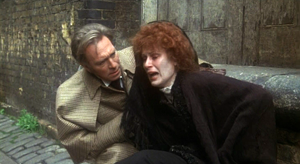 But Watson replies by reminding Holmes of the sacrifices of the women who have died, which the film has explained. He provides a view that balances that of Holmes.)
But Watson replies by reminding Holmes of the sacrifices of the women who have died, which the film has explained. He provides a view that balances that of Holmes.)
Part of the movie’s success is the tremendous cast of supporting actors. (The one exception might be Donald Sutherland as Robert Lees. It is just plain odd. You don’t know what to make of it.)
Perhaps the most riveting scene in the film is the confrontation between Holmes and Lord Salisbury, the British Prime Minister played by John Gielgud. Very cold and fearsomely patriarchal, austere and condescending, Gielgud stands above as Holmes explains what he has uncovered, the conspiracy surrounding Annie Crook (Geneviève Bujold) and her child.
While Gielgud portrays authoritarian self-righteousness, Plummer answers back with moral indignation, “If I appear offensive Mr. Prime Minister you can take it that I am offended!”
 It’s great stuff. The film is filled with wonderful lines and fabulous moments. It is also a film characterized by intelligent restraint. Whereas subject matter like Jack the Ripper would be an excuse for another director to fill the screen with violent, blood-soaked images, in Murder By Decree there is very little and that which does appear on screen is suggestive rather than actually shown.
It’s great stuff. The film is filled with wonderful lines and fabulous moments. It is also a film characterized by intelligent restraint. Whereas subject matter like Jack the Ripper would be an excuse for another director to fill the screen with violent, blood-soaked images, in Murder By Decree there is very little and that which does appear on screen is suggestive rather than actually shown.
And of course, being a mystery, the movie is enthralling from start to finish with suspense. It’s an atmospheric movie too as it creates a great sense of dark and dreary Victorian London.
Murder By Decree was and still remains a favourite of mine. Highly recommended.
See: 20 Movies – The List
Murder by Decree (the trailer)

